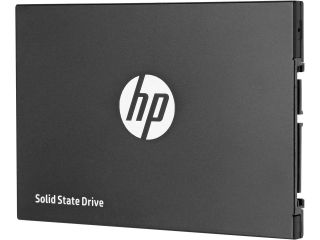HP S700 Pro SSD Review
Why you can trust Tom's Hardware
Conclusion
The HP S700 Pro comes to market at a really strange time. The SSD market went through the worst NAND shortage in history, but we are on the cusp of recovery. New 3D NAND technology is the savior, and it's so close we can literally touch it (because it's here in the test lab). The HP S700 Pro series uses previous-generation components that proved to be troublesome in some ways -- 384Gbit NAND has exhibited horrific latency in every device we tested. The dual-core SMI controller compounds the latency issue because it suffers from its own set of challenges.

HP managed to tame some of the SMI issues and even drove down the NAND latency. This is the product we wish arrived last year when IMFT handed us first-generation 32-layer 3D NAND. What a difference a year makes. There's a lot of progress with this combination, but it's too little, too late. By the time you read this, we'll already have the Intel SSD 545s review online. The new SSD employs the second-generation IMFT 64-layer 3D NAND with 256Gbit die, and that should change the market.
The HP S700 Pro isn't a bad SSD on its own. We like some aspects of the series, but the price washes the love away. It's hard to believe we're still using the Samsung 850 EVO to compare other SATA SSDs, but the EVO will be in the conversation until something matches or beats its overall value. Both S700 Pro SSDs we tested cost more than the 850 EVO in similar capacities, yet trail in performance.
HP offers an S700 (non-Pro) model that should arrive at the lab in a few days. We're not sure about the hardware configuration of the non-Pro versions but were told the performance is similar to the Pro. The price is, on the other hand, much lower. We also had a peek at HP's roadmap that should take us into early 2018. The S700 Pro is far from the flagship moving forward. At Computex, we heard mutterings about a new Realtek PCIe 3.0 x8 controller coming to market, and HP will take a serious look at the unprecedented controller.
MORE: Best SSDs
MORE: How We Test HDDs And SSDs
MORE: All SSD Content
Stay on the Cutting Edge
Join the experts who read Tom's Hardware for the inside track on enthusiast PC tech news — and have for over 25 years. We'll send breaking news and in-depth reviews of CPUs, GPUs, AI, maker hardware and more straight to your inbox.
-
AgentLozen Good article.Reply
I agree with your conclusion. This isn't a bad SSD, but it's neither the fastest nor the cheapest. There's nothing really special about it. -
shrapnel_indie The only thing that could be considered special is that it's a HP. But that isn't near enough for the consumer market, albeit it might be for the business market.Reply -
Brian_R170 In the specifications section, the Capacity (Raw/User) for the 512GB version is shown as 288GB/256GB.Reply -
Nei1 One day, there was a flood in Thailand, and the quality of Western Digital never recovered. The consumer learned that "There are only two kinds of drives -- those that have failed and those that haven't failed yet." So we either spend time trying to remember all the things we wanted to back up with a collection of expensive low-reliability external drives, or employ RAID -- spend more money on purchasing redundant low-reliability drives -- the only reliability that was available since the flood.Reply
And when I say "low reliability," I'm saying that relative to Western Digital's 80 GB IDE drive, or earlier generation that didn't fail unless you hit them with a hammer. Backing up was a simple as a similarly dependable hard drive in an external enclosure, which took some money and maintenance, but it wasn't awful. This is my standard for reliability, for quality, and until we reach that state again, the consumer is being played for a sucker.
Now, instead of spindles and heads wearing out (faster than ever before), there's the threat of the transistors in the SSDs wearing out. There are sufficient reviews by consumers to make it clear that SSDs are a gamble, so it's up to the individual to spend as much money as he has on an SSD that seems to get the best reviews for reliability vs. price. There are only two types of consumers -- those whose SSDs have suddenly failed, and those whose SSDs haven't suddenly failed yet.
What would be good is if the next memory-technology will not have a limitation on lifetime. That would be worthy of being called "an improvement in reliability." -
nyannyan I'm willing to bet that WD's 80 GB drives were nowhere *near* the worst drive even in their era (*cough*Maxtor*cough*), and that's not even getting to drives that were mostly DOA (can't remember the mfr, they went bust shortly after).Reply -
Ncogneto There's a lot of progress with this combination, but it's too little, too late. By the time you read this, we'll already have the Intel SSD 545s review onlineReply
Well, we're waiting..... -
jaxstas "HP was the world's leading PC manufacturer, and it made it without a cow theme or a "dude" actor."Reply
HP bought Compaq. That's how they acquired the computer technology they have today. Prior, their stuff was bad. -
shrapnel_indie Reply19906593 said:"HP was the world's leading PC manufacturer, and it made it without a cow theme or a "dude" actor."
HP bought Compaq. That's how they acquired the computer technology they have today. Prior, their stuff was bad.
Compaq was also hitting the bottom of the barrel around that time too.

